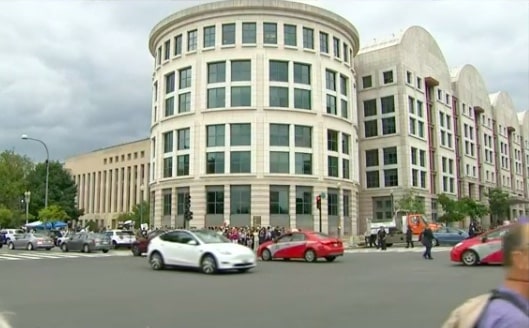Moments before a court-imposed 5pm ET deadline, former President Trump’s legal team responded to a request for a protective order filed by the Department of Justice.
Trump’s defense team argues to narrow the protective order, to shield only “genuinely sensitive” material from public view.
U.S. District Court Judge Tanya Chutkan imposed the 5pm deadline following the DOJ request for the order after Trump posted on his Truth Social platform, in all caps, “IF YOU GO AFTER ME, I’M COMING AFTER YOU!”
That’s despite Trump having sworn before Magistrate Judge Moxila A. Upadhyay at his arraignment on four criminal counts surrounding attempts to overturn the 2020 Presidential election and the related the January 6, 2021 insurrection on the U.S Capitol that he would not intimidate witnesses or communicate with them without legal counsel present.
A Trump spokesperson has called Trump’s social media posting political speech, and his lawyers’ response to the protective order request would seem to further that argument, saying that “the government requests the Court assume the role of censor, and impose content-based regulations on President Trump’s political speech that would forbid him from publicly discussing or disclosing all non-public documents produced by the government, including both purportedly and sensitive materials.”
The order further accuses President Biden of social media trolling, saying the current President “likewise capitalized on the indictment, posting a thinly veiled reference to his administration’s prosecution just hours before arraignment.”
Protective orders are common in criminal cases. However, federal prosecutors in the office of Special Counsel Jack Smith said in their protective order request that it’s “particularly important in this case” because Trump has posted on social media about “witnesses, judges, attorneys, and others associated with legal matters pending against him.”
The prosecution further said it’s ready to hand over a “substantial” amount of evidence, including “sensitive and confidential information” to Trump’s defense team, asserting that if Trump were to begin posting about grand jury transcripts or other evidence, it could have a “harmful chilling effect on witnesses or adversely affect the fair administration of justice in this case.”
The DOJ’s protective order seeks to prevent Trump and his attorneys from divulging materials provided by the government to anyone other than people on his legal team, possible witnesses or their attorneys, or anyone approved by the court. The order would also place stricter limits on “sensitive materials,” including grand jury witness testimony and materials obtained through sealed search warrants.
The Trump team’s response to the protective order can be read here.
PHOTO: DC Federal Courthouse during Trump’s August 3 arraignment


